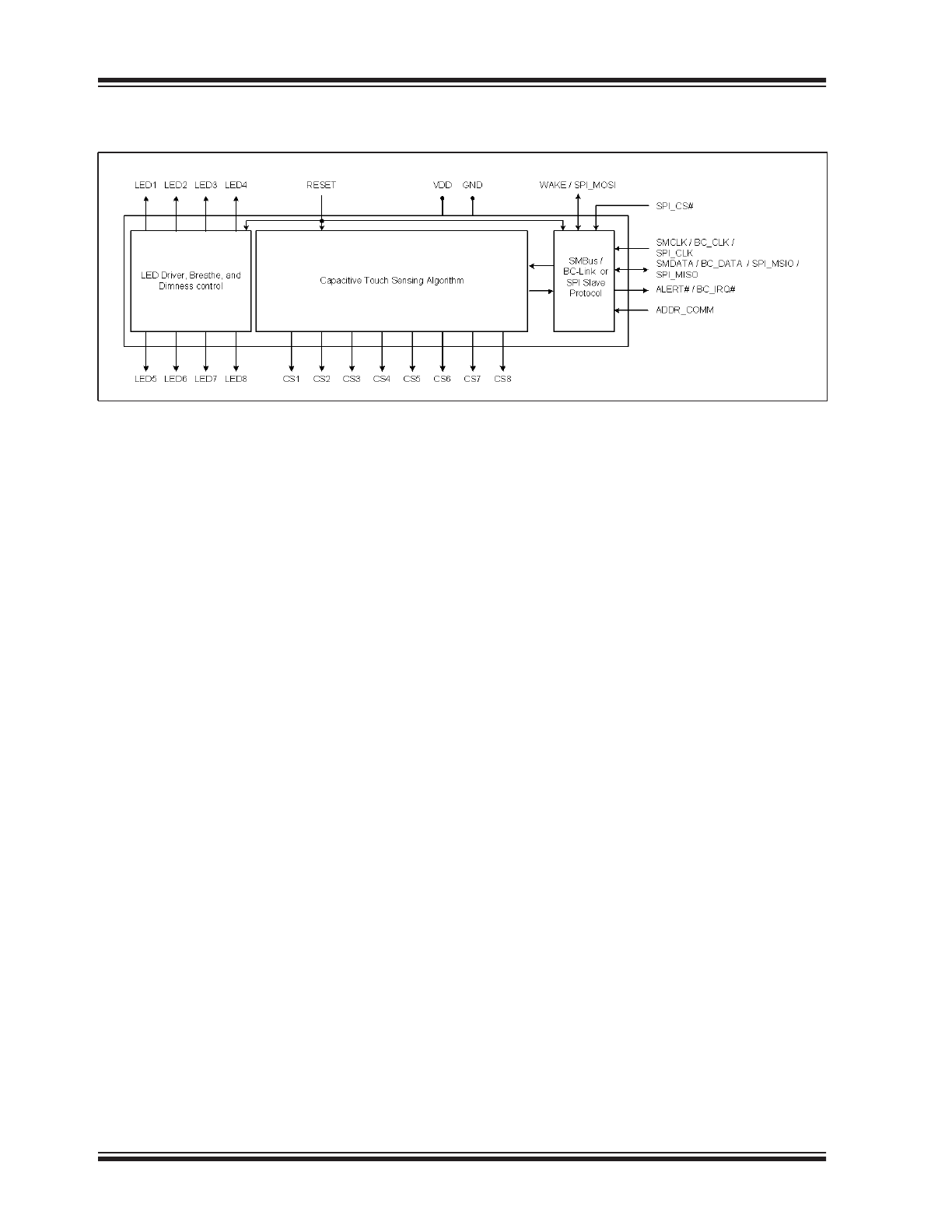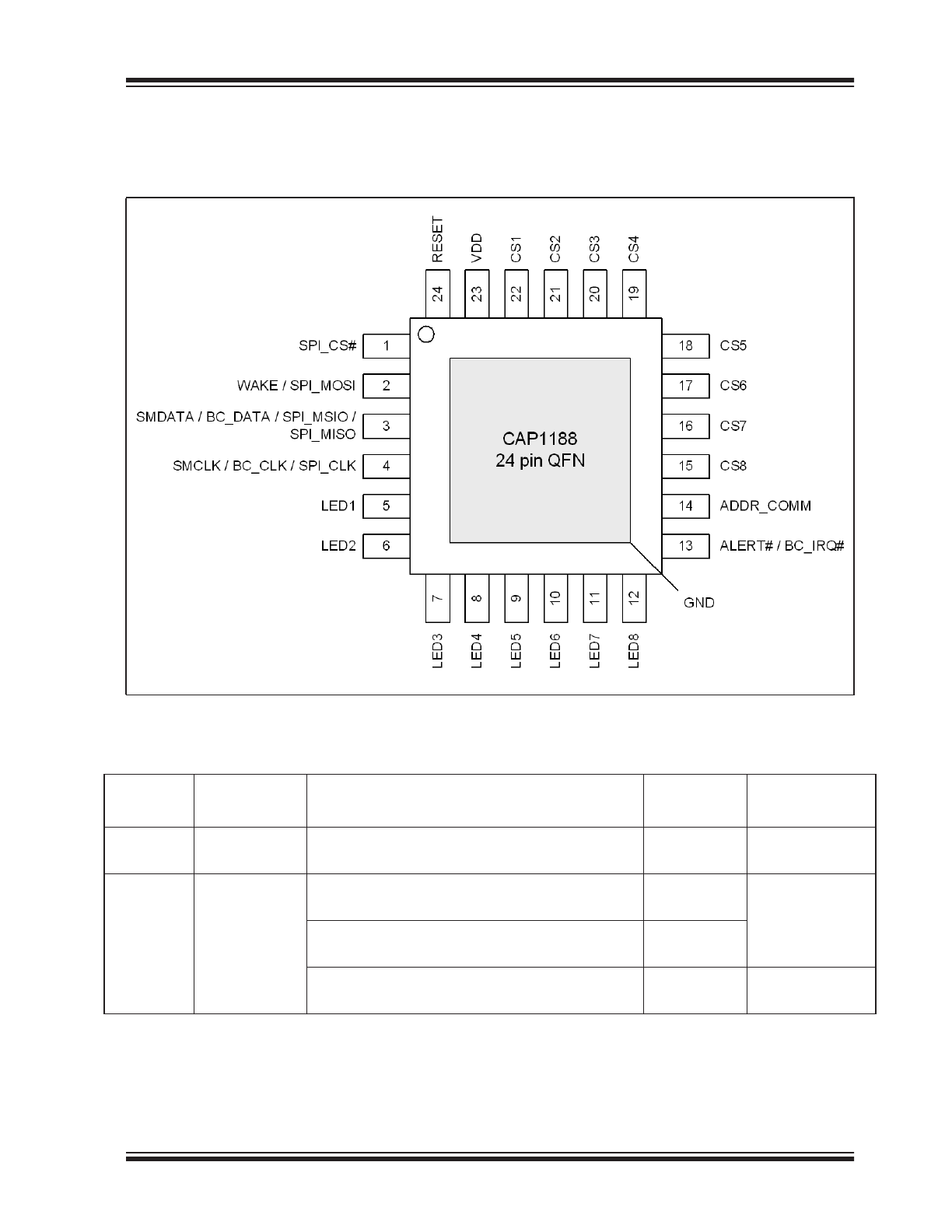
2015 Microchip Technology Inc.
DS00001620C-page 1
General Description
The CAP1188, which incorporates RightTouch
®
tech-
nology, is a multiple channel Capacitive Touch sensor
with multiple power LED drivers. It contains eight (8)
individual capacitive touch sensor inputs with program-
mable sensitivity for use in touch sensor applications.
Each sensor input automatically recalibrates to com-
pensate for gradual environmental changes.
The CAP1188 also contains eight (8) LED drivers that
offer full-on / off, variable rate blinking, dimness con-
trols, and breathing. Each of the LED drivers may be
linked to one of the sensor inputs to be actuated when
a touch is detected. As well, each LED driver may be
individually controlled via a host controller.
The CAP1188 includes Multiple Pattern Touch recogni-
tion that allows the user to select a specific set of but-
tons to be touched simultaneously. If this pattern is
detected, then a status bit is set and an interrupt gen-
erated.
Additionally, the CAP1188 includes circuitry and sup-
port for enhanced sensor proximity detection.
The CAP1188 offers multiple power states operating at
low quiescent currents. In the Standby state of opera-
tion, one or more capacitive touch sensor inputs are
active and all LEDs may be used. If a touch is detected,
it will wake the system using the WAKE/SPI_MOSI pin.
Deep Sleep is the lowest power state available, draw-
ing 5uA (typical) of current. In this state, no sensor
inputs are active. Driving the WAKE/SPI_MOSI pin or
communications will wake the device.
Applications
• Desktop and Notebook PCs
• LCD Monitors
• Consumer Electronics
• Appliances
Features
• Eight (8) Capacitive Touch Sensor Inputs
- Programmable sensitivity
- Automatic recalibration
- Individual thresholds for each button
• Proximity Detection
• Multiple Button Pattern Detection
• Calibrates for Parasitic Capacitance
• Analog Filtering for System Noise Sources
• Press and Hold feature for Volume-like Applica-
tions
• Multiple Communication Interfaces
- SMBus / I
2
C compliant interface
- SPI communications
- Pin selectable communications protocol and
multiple slave addresses (SMBus / I
2
C only)
• Low Power Operation
- 5uA quiescent current in Deep Sleep
- 50uA quiescent current in Standby (1 sensor
input monitored)
- Samples one or more channels in Standby
• Eight (8) LED Driver Outputs
- Open Drain or Push-Pull
- Programmable blink, breathe, and dimness
controls
- Can be linked to Capacitive Touch Sensor
inputs
• Dedicated Wake output flags touches in low
power state
• System RESET pin
• Available in 24-pin 4mm x 4mm RoHS compliant
QFN package
CAP1188
8 Channel Capacitive Touch Sensor with 8 LED Drivers

CAP1188
DS00001620C-page 2
2015 Microchip Technology Inc.
TO OUR VALUED CUSTOMERS
It is our intention to provide our valued customers with the best documentation possible to ensure successful use of your Microchip
products. To this end, we will continue to improve our publications to better suit your needs. Our publications will be refined and
enhanced as new volumes and updates are introduced.
If you have any questions or comments regarding this publication, please contact the Marketing Communications Department via
E-mail at
docerrors@microchip.com
. We welcome your feedback.
Most Current Data Sheet
To obtain the most up-to-date version of this data sheet, please register at our Worldwide Web site at:
http://www.microchip.com
You can determine the version of a data sheet by examining its literature number found on the bottom outside corner of any page.
The last character of the literature number is the version number, (e.g., DS30000000A is version A of document DS30000000).
Errata
An errata sheet, describing minor operational differences from the data sheet and recommended workarounds, may exist for cur-
rent devices. As device/documentation issues become known to us, we will publish an errata sheet. The errata will specify the
revision of silicon and revision of document to which it applies.
To determine if an errata sheet exists for a particular device, please check with one of the following:
• Microchip’s Worldwide Web site;
http://www.microchip.com
• Your local Microchip sales office (see last page)
When contacting a sales office, please specify which device, revision of silicon and data sheet (include -literature number) you are
using.
Customer Notification System
Register on our web site at
www.microchip.com
to receive the most current information on all of our products.

2015 Microchip Technology Inc.
DS00001620C-page 3
CAP1188
Table of Contents
1.0 Block Diagram ................................................................................................................................................................................. 4
2.0 Pin Description ................................................................................................................................................................................ 5
3.0 Electrical Specifications .................................................................................................................................................................. 9
4.0 Communications ........................................................................................................................................................................... 12
5.0 General Description ...................................................................................................................................................................... 23
6.0 Register Description ...................................................................................................................................................................... 29
7.0 Package Information ..................................................................................................................................................................... 67
Appendix A: Device Delta ................................................................................................................................................................... 72
Appendix B: Data Sheet Revision History ........................................................................................................................................... 74
The Microchip Web Site ...................................................................................................................................................................... 76
Customer Change Notification Service ............................................................................................................................................... 76
Customer Support ............................................................................................................................................................................... 76
Product Identification System ............................................................................................................................................................. 77

CAP1188
DS00001620C-page 4
2015 Microchip Technology Inc.
1.0
BLOCK DIAGRAM

2015 Microchip Technology Inc.
DS00001620C-page 5
CAP1188
2.0
PIN DESCRIPTION
FIGURE 2-1:
CAP1188 Pin Diagram (24-Pin QFN)
TABLE 2-1:
PIN DESCRIPTION FOR CAP1188
Pin #
Pin Name
Pin Function
Pin Type
Unused
Connection
1
SPI_CS#
Active low chip-select for SPI bus
DI (5V)
Connect to
Ground
2
WAKE / SPI_-
MOSI
WAKE - Active high wake / interrupt output -
Standby power state - requires pull-down resistor
DO
Pull-down Resis-
tor
WAKE - Active high wake input Deep Sleep power
state - requires pull-down resistor
DI
SPI_MOSI - SPI Master-Out-Slave-In port when
used in normal mode
DI (5V)
Connect to
Ground

CAP1188
DS00001620C-page 6
2015 Microchip Technology Inc.
3
SMDATA /
SPI_MSIO /
SPI_MISO
SMDATA - Bi-directional, open-drain SMBus data
- requires pull-up resistor
DIOD (5V)
n/a
SPI_MSIO - SPI Master-Slave-In-Out bidirectional
port when used in bi-directional mode
DIO
SPI_MISO - SPI Master-In-Slave-Out port when
used in normal mode
DO
4
SMCLK / BC_-
CLK / SPI_-
CLK
SMCLK - SMBus clock input - requires pull-up
resistor
DI (5V)
n/a
SPI_CLK - SPI clock input
DI (5V)
5
LED1
Open drain LED 1 driver (default)
OD (5V)
Connect to
Ground
Push-pull LED 1 driver
DO
leave open or
connect to
Ground
6
LED2
Open drain LED 2 driver (default)
OD (5V)
Connect to
Ground
Push-pull LED 2 driver
DO
leave open or
connect to
Ground
7
LED3
Open drain LED 3 driver (default)
OD (5V)
Connect to
Ground
Push-pull LED 3 driver
DO
leave open or
connect to
Ground
8
LED4
Open drain LED 4 driver (default)
OD (5V)
Connect to
Ground
Push-pull LED 4 driver
DO
leave open or
connect to
Ground
9
LED5
Open drain LED 5 driver (default)
OD (5V)
Connect to
Ground
Push-pull LED 5 driver
DO
leave open or
connect to
Ground
10
LED6
Open drain LED 6 driver (default)
OD (5V)
Connect to
Ground
Push-pull LED 6 driver
DO
leave open or
connect to
Ground
TABLE 2-1:
PIN DESCRIPTION FOR CAP1188 (CONTINUED)
Pin #
Pin Name
Pin Function
Pin Type
Unused
Connection

2015 Microchip Technology Inc.
DS00001620C-page 7
CAP1188
APPLICATION NOTE:
When the ALERT# pinis configured as an active low output, it will be open drain. When it is
configured as an active high output, it will be push-pull.
APPLICATION NOTE:
For the 5V tolerant pins that have a pull-up resistor, the pull-up voltage must not exceed 3.6V
when the CAP1188 is unpowered.
APPLICATION NOTE:
The SPI_CS# pin should be grounded when SMBus, or I
2
C,communications are used.
The pin types are described in
Table 2-2
. All pins labeled with (5V) are 5V tolerant.
11
LED7
Open drain LED 7 driver (default)
OD (5V)
Connect to
Ground
Push-pull LED 7 driver
DO
leave open or
connect to
Ground
12
LED8
Open drain LED 8 driver (default)
OD (5V)
Connect to
Ground
Push-pull LED 8 driver
DO
leave open or
connect to
Ground
13
ALERT#
ALERT# - Active low alert / interrupt output for
SMBus alert or SPI interrupt - requires pull-up resis-
tor (default)
OD (5V)
Connect to
Ground
ALERT - Active high push-pull alert / interrupt out-
put for SMBus alert or SPI interrupt
DO leave
open
14
ADDR_COMM
Address / communications select pin - pull-down
resistor determines address / communications
mechanism
AI
n/a
15
CS8
Capacitive Touch Sensor Input 8
AIO
Connect to
Ground
16
CS7
Capacitive Touch Sensor Input 7
AIO
Connect to GND
17
CS6
Capacitive Touch Sensor Input 6
AIO
Connect to GND
18
CS5
Capacitive Touch Sensor Input 5
AIO
Connect to GND
19
CS4
Capacitive Touch Sensor Input 4
AIO
Connect to GND
20
CS3
Capacitive Touch Sensor Input 3
AIO
Connect to GND
21
CS2
Capacitive Touch Sensor Input 2
AIO
Connect to GND
22
CS1
Capacitive Touch Sensor Input 1
AIO
Connect to GND
23
VDD
Positive Power supply
Power
n/a
24
RESET
Active high soft reset for system - resets all regis-
ters to default values.
DI (5V)
Connect to GND
Bottom
Pad
GND
Ground
Power
n/a
TABLE 2-1:
PIN DESCRIPTION FOR CAP1188 (CONTINUED)
Pin #
Pin Name
Pin Function
Pin Type
Unused
Connection

CAP1188
DS00001620C-page 8
2015 Microchip Technology Inc.
TABLE 2-2:
PIN TYPES
Pin Type
Description
Power
This pin is used to supply power or ground to the device.
DI
Digital Input - This pin is used as a digital input. This pin is 5V tolerant.
AIO
Analog Input / Output -This pin is used as an I/O for analog signals.
DIOD
Digital Input / Open Drain Output - This pin is used as a digital I/O. When it is used as an out-
put, it is open drain and requires a pull-up resistor. This pin is 5V tolerant.
OD
Open Drain Digital Output - This pin is used as a digital output. It is open drain and requires a
pull-up resistor. This pin is 5V tolerant.
DO
Push-pull Digital Output - This pin is used as a digital output and can sink and source current.
DIO
Push-pull Digital Input / Output - This pin is used as an I/O for digital signals.

2015 Microchip Technology Inc.
DS00001620C-page 9
CAP1188
3.0
ELECTRICAL SPECIFICATIONS
Note 3-1
Stresses above those listed could cause permanent damage to the device. This is a stress rating
only and functional operation of the device at any other condition above those indicated in the
operation sections of this specification is not implied.
Note 3-2
For the 5V tolerant pins that have a pull-up resistor, the voltage difference between V
5VT_PIN
and V
DD
must never exceed 3.6V.
Note 3-3
The Package Power Dissipation specification assumes a recommended thermal via design consisting
of a 3x3 matrix of 0.3mm (12mil) vias at 1.0mm pitch connected to the ground plane with a 2.5 x
2.5mm thermal landing.
Note 3-4
Junction to Ambient (
JA
) is dependent on the design of the thermal vias. Without thermal vias and
a thermal landing, the
JA
is approximately 60°C/W including localized PCB temperature increase.
TABLE 3-1:
ABSOLUTE MAXIMUM RATINGS
Voltage on 5V tolerant pins (V
5VT_PIN
)
-0.3 to 5.5
V
Voltage on 5V tolerant pins (|V
5VT_PIN
- V
DD
|)
Note 3-2
0 to 3.6
V
Voltage on VDD pin
-0.3 to 4
V
Voltage on any other pin to GND
-0.3 to VDD + 0.3
V
Package Power Dissipation up to T
A
= 85°C for 24 pin QFN
(see
Note 3-3
)
0.9
W
Junction to Ambient (
JA
) (see
Note 3-4
)
58
°C/W
Operating Ambient Temperature Range
-40 to 125
°C
Storage Temperature Range
-55 to 150
°C
ESD Rating, All Pins, HBM
8000
V

CAP1188
DS00001620C-page 10
2015 Microchip Technology Inc.
TABLE 3-2:
ELECTRICAL SPECIFICATIONS
V
DD
= 3V to 3.6V, T
A
= 0°C to 85°C, all typical values at T
A
= 27°C unless otherwise noted.
Characteristic
Symbol
Min
Typ
Max
Unit
Conditions
DC Power
Supply Voltage
V
DD
3.0
3.3
3.6
V
Supply Current
I
STBY
120
170
uA
Standby state active
1 sensor input monitored
No LEDs active
Default conditions (8 avg, 70ms
cycle time)
I
STBY
50
uA
Standby state active
1 sensor input monitored
No LEDs active
1 avg, 140ms cycle time,
I
DSLEEP
5
15
uA
Deep Sleep state active
LEDs at 100% or 0% Duty Cycle
No communications
T
A
< 40°C
3.135 < V
DD
< 3.465V
I
DD
500
600
uA
Capacitive Sensing Active
No LEDs active
Capacitive Touch Sensor Inputs
Maximum Base
Capacitance
C
BASE
50
pF
Pad untouched
Minimum Detectable
Capacitive Shift
C
TOUCH
20
fF
Pad touched - default conditions (1
avg, 35ms cycle time, 1x sensitiv-
ity)
Recommended Cap
Shift
C
TOUCH
0.1
2
pF
Pad touched - Not tested
Power Supply Rejec-
tion
PSR
±3
±10
counts /
V
Untouched Current Counts
Base Capacitance 5pF - 50pF
Maximum sensitivity
Negative Delta Counts disabled
All other parameters default
Timing
RESET Pin Delay
t
RST_DLY
10
ms
Time to communica-
tions ready
t
COMM_DLY
15
ms
Time to first conver-
sion ready
t
CONV_DLY
170
200
ms
LED Drivers
Duty Cycle
DUTY
LED
0
100
%
Programmable
Drive Frequency
f
LED
2
kHz
Sinking Current
I
SINK
24
mA
V
OL
= 0.4
Sourcing Current
I
SOURCE
24
mA
V
OH
= V
DD
- 0.4
Leakage Current
I
LEAK
±5
uA
powered or unpowered
TA < 85°C
pull-up voltage < 3.6V if unpowered
I/O Pins
Output Low Voltage
V
OL
0.4
V
I
SINK_IO
= 8mA
Output High Voltage
V
OH
V
DD
- 0.4
V
I
SOURCE_IO
= 8mA

2015 Microchip Technology Inc.
DS00001620C-page 1
General Description
The CAP1188, which incorporates RightTouch
®
tech-
nology, is a multiple channel Capacitive Touch sensor
with multiple power LED drivers. It contains eight (8)
individual capacitive touch sensor inputs with program-
mable sensitivity for use in touch sensor applications.
Each sensor input automatically recalibrates to com-
pensate for gradual environmental changes.
The CAP1188 also contains eight (8) LED drivers that
offer full-on / off, variable rate blinking, dimness con-
trols, and breathing. Each of the LED drivers may be
linked to one of the sensor inputs to be actuated when
a touch is detected. As well, each LED driver may be
individually controlled via a host controller.
The CAP1188 includes Multiple Pattern Touch recogni-
tion that allows the user to select a specific set of but-
tons to be touched simultaneously. If this pattern is
detected, then a status bit is set and an interrupt gen-
erated.
Additionally, the CAP1188 includes circuitry and sup-
port for enhanced sensor proximity detection.
The CAP1188 offers multiple power states operating at
low quiescent currents. In the Standby state of opera-
tion, one or more capacitive touch sensor inputs are
active and all LEDs may be used. If a touch is detected,
it will wake the system using the WAKE/SPI_MOSI pin.
Deep Sleep is the lowest power state available, draw-
ing 5uA (typical) of current. In this state, no sensor
inputs are active. Driving the WAKE/SPI_MOSI pin or
communications will wake the device.
Applications
• Desktop and Notebook PCs
• LCD Monitors
• Consumer Electronics
• Appliances
Features
• Eight (8) Capacitive Touch Sensor Inputs
- Programmable sensitivity
- Automatic recalibration
- Individual thresholds for each button
• Proximity Detection
• Multiple Button Pattern Detection
• Calibrates for Parasitic Capacitance
• Analog Filtering for System Noise Sources
• Press and Hold feature for Volume-like Applica-
tions
• Multiple Communication Interfaces
- SMBus / I
2
C compliant interface
- SPI communications
- Pin selectable communications protocol and
multiple slave addresses (SMBus / I
2
C only)
• Low Power Operation
- 5uA quiescent current in Deep Sleep
- 50uA quiescent current in Standby (1 sensor
input monitored)
- Samples one or more channels in Standby
• Eight (8) LED Driver Outputs
- Open Drain or Push-Pull
- Programmable blink, breathe, and dimness
controls
- Can be linked to Capacitive Touch Sensor
inputs
• Dedicated Wake output flags touches in low
power state
• System RESET pin
• Available in 24-pin 4mm x 4mm RoHS compliant
QFN package
CAP1188
8 Channel Capacitive Touch Sensor with 8 LED Drivers

CAP1188
DS00001620C-page 2
2015 Microchip Technology Inc.
TO OUR VALUED CUSTOMERS
It is our intention to provide our valued customers with the best documentation possible to ensure successful use of your Microchip
products. To this end, we will continue to improve our publications to better suit your needs. Our publications will be refined and
enhanced as new volumes and updates are introduced.
If you have any questions or comments regarding this publication, please contact the Marketing Communications Department via
E-mail at
docerrors@microchip.com
. We welcome your feedback.
Most Current Data Sheet
To obtain the most up-to-date version of this data sheet, please register at our Worldwide Web site at:
http://www.microchip.com
You can determine the version of a data sheet by examining its literature number found on the bottom outside corner of any page.
The last character of the literature number is the version number, (e.g., DS30000000A is version A of document DS30000000).
Errata
An errata sheet, describing minor operational differences from the data sheet and recommended workarounds, may exist for cur-
rent devices. As device/documentation issues become known to us, we will publish an errata sheet. The errata will specify the
revision of silicon and revision of document to which it applies.
To determine if an errata sheet exists for a particular device, please check with one of the following:
• Microchip’s Worldwide Web site;
http://www.microchip.com
• Your local Microchip sales office (see last page)
When contacting a sales office, please specify which device, revision of silicon and data sheet (include -literature number) you are
using.
Customer Notification System
Register on our web site at
www.microchip.com
to receive the most current information on all of our products.

2015 Microchip Technology Inc.
DS00001620C-page 3
CAP1188
Table of Contents
1.0 Block Diagram ................................................................................................................................................................................. 4
2.0 Pin Description ................................................................................................................................................................................ 5
3.0 Electrical Specifications .................................................................................................................................................................. 9
4.0 Communications ........................................................................................................................................................................... 12
5.0 General Description ...................................................................................................................................................................... 23
6.0 Register Description ...................................................................................................................................................................... 29
7.0 Package Information ..................................................................................................................................................................... 67
Appendix A: Device Delta ................................................................................................................................................................... 72
Appendix B: Data Sheet Revision History ........................................................................................................................................... 74
The Microchip Web Site ...................................................................................................................................................................... 76
Customer Change Notification Service ............................................................................................................................................... 76
Customer Support ............................................................................................................................................................................... 76
Product Identification System ............................................................................................................................................................. 77

CAP1188
DS00001620C-page 4
2015 Microchip Technology Inc.
1.0
BLOCK DIAGRAM

2015 Microchip Technology Inc.
DS00001620C-page 5
CAP1188
2.0
PIN DESCRIPTION
FIGURE 2-1:
CAP1188 Pin Diagram (24-Pin QFN)
TABLE 2-1:
PIN DESCRIPTION FOR CAP1188
Pin #
Pin Name
Pin Function
Pin Type
Unused
Connection
1
SPI_CS#
Active low chip-select for SPI bus
DI (5V)
Connect to
Ground
2
WAKE / SPI_-
MOSI
WAKE - Active high wake / interrupt output -
Standby power state - requires pull-down resistor
DO
Pull-down Resis-
tor
WAKE - Active high wake input Deep Sleep power
state - requires pull-down resistor
DI
SPI_MOSI - SPI Master-Out-Slave-In port when
used in normal mode
DI (5V)
Connect to
Ground

CAP1188
DS00001620C-page 6
2015 Microchip Technology Inc.
3
SMDATA /
SPI_MSIO /
SPI_MISO
SMDATA - Bi-directional, open-drain SMBus data
- requires pull-up resistor
DIOD (5V)
n/a
SPI_MSIO - SPI Master-Slave-In-Out bidirectional
port when used in bi-directional mode
DIO
SPI_MISO - SPI Master-In-Slave-Out port when
used in normal mode
DO
4
SMCLK / BC_-
CLK / SPI_-
CLK
SMCLK - SMBus clock input - requires pull-up
resistor
DI (5V)
n/a
SPI_CLK - SPI clock input
DI (5V)
5
LED1
Open drain LED 1 driver (default)
OD (5V)
Connect to
Ground
Push-pull LED 1 driver
DO
leave open or
connect to
Ground
6
LED2
Open drain LED 2 driver (default)
OD (5V)
Connect to
Ground
Push-pull LED 2 driver
DO
leave open or
connect to
Ground
7
LED3
Open drain LED 3 driver (default)
OD (5V)
Connect to
Ground
Push-pull LED 3 driver
DO
leave open or
connect to
Ground
8
LED4
Open drain LED 4 driver (default)
OD (5V)
Connect to
Ground
Push-pull LED 4 driver
DO
leave open or
connect to
Ground
9
LED5
Open drain LED 5 driver (default)
OD (5V)
Connect to
Ground
Push-pull LED 5 driver
DO
leave open or
connect to
Ground
10
LED6
Open drain LED 6 driver (default)
OD (5V)
Connect to
Ground
Push-pull LED 6 driver
DO
leave open or
connect to
Ground
TABLE 2-1:
PIN DESCRIPTION FOR CAP1188 (CONTINUED)
Pin #
Pin Name
Pin Function
Pin Type
Unused
Connection

2015 Microchip Technology Inc.
DS00001620C-page 7
CAP1188
APPLICATION NOTE:
When the ALERT# pinis configured as an active low output, it will be open drain. When it is
configured as an active high output, it will be push-pull.
APPLICATION NOTE:
For the 5V tolerant pins that have a pull-up resistor, the pull-up voltage must not exceed 3.6V
when the CAP1188 is unpowered.
APPLICATION NOTE:
The SPI_CS# pin should be grounded when SMBus, or I
2
C,communications are used.
The pin types are described in
Table 2-2
. All pins labeled with (5V) are 5V tolerant.
11
LED7
Open drain LED 7 driver (default)
OD (5V)
Connect to
Ground
Push-pull LED 7 driver
DO
leave open or
connect to
Ground
12
LED8
Open drain LED 8 driver (default)
OD (5V)
Connect to
Ground
Push-pull LED 8 driver
DO
leave open or
connect to
Ground
13
ALERT#
ALERT# - Active low alert / interrupt output for
SMBus alert or SPI interrupt - requires pull-up resis-
tor (default)
OD (5V)
Connect to
Ground
ALERT - Active high push-pull alert / interrupt out-
put for SMBus alert or SPI interrupt
DO leave
open
14
ADDR_COMM
Address / communications select pin - pull-down
resistor determines address / communications
mechanism
AI
n/a
15
CS8
Capacitive Touch Sensor Input 8
AIO
Connect to
Ground
16
CS7
Capacitive Touch Sensor Input 7
AIO
Connect to GND
17
CS6
Capacitive Touch Sensor Input 6
AIO
Connect to GND
18
CS5
Capacitive Touch Sensor Input 5
AIO
Connect to GND
19
CS4
Capacitive Touch Sensor Input 4
AIO
Connect to GND
20
CS3
Capacitive Touch Sensor Input 3
AIO
Connect to GND
21
CS2
Capacitive Touch Sensor Input 2
AIO
Connect to GND
22
CS1
Capacitive Touch Sensor Input 1
AIO
Connect to GND
23
VDD
Positive Power supply
Power
n/a
24
RESET
Active high soft reset for system - resets all regis-
ters to default values.
DI (5V)
Connect to GND
Bottom
Pad
GND
Ground
Power
n/a
TABLE 2-1:
PIN DESCRIPTION FOR CAP1188 (CONTINUED)
Pin #
Pin Name
Pin Function
Pin Type
Unused
Connection

CAP1188
DS00001620C-page 8
2015 Microchip Technology Inc.
TABLE 2-2:
PIN TYPES
Pin Type
Description
Power
This pin is used to supply power or ground to the device.
DI
Digital Input - This pin is used as a digital input. This pin is 5V tolerant.
AIO
Analog Input / Output -This pin is used as an I/O for analog signals.
DIOD
Digital Input / Open Drain Output - This pin is used as a digital I/O. When it is used as an out-
put, it is open drain and requires a pull-up resistor. This pin is 5V tolerant.
OD
Open Drain Digital Output - This pin is used as a digital output. It is open drain and requires a
pull-up resistor. This pin is 5V tolerant.
DO
Push-pull Digital Output - This pin is used as a digital output and can sink and source current.
DIO
Push-pull Digital Input / Output - This pin is used as an I/O for digital signals.

2015 Microchip Technology Inc.
DS00001620C-page 9
CAP1188
3.0
ELECTRICAL SPECIFICATIONS
Note 3-1
Stresses above those listed could cause permanent damage to the device. This is a stress rating
only and functional operation of the device at any other condition above those indicated in the
operation sections of this specification is not implied.
Note 3-2
For the 5V tolerant pins that have a pull-up resistor, the voltage difference between V
5VT_PIN
and V
DD
must never exceed 3.6V.
Note 3-3
The Package Power Dissipation specification assumes a recommended thermal via design consisting
of a 3x3 matrix of 0.3mm (12mil) vias at 1.0mm pitch connected to the ground plane with a 2.5 x
2.5mm thermal landing.
Note 3-4
Junction to Ambient (
JA
) is dependent on the design of the thermal vias. Without thermal vias and
a thermal landing, the
JA
is approximately 60°C/W including localized PCB temperature increase.
TABLE 3-1:
ABSOLUTE MAXIMUM RATINGS
Voltage on 5V tolerant pins (V
5VT_PIN
)
-0.3 to 5.5
V
Voltage on 5V tolerant pins (|V
5VT_PIN
- V
DD
|)
Note 3-2
0 to 3.6
V
Voltage on VDD pin
-0.3 to 4
V
Voltage on any other pin to GND
-0.3 to VDD + 0.3
V
Package Power Dissipation up to T
A
= 85°C for 24 pin QFN
(see
Note 3-3
)
0.9
W
Junction to Ambient (
JA
) (see
Note 3-4
)
58
°C/W
Operating Ambient Temperature Range
-40 to 125
°C
Storage Temperature Range
-55 to 150
°C
ESD Rating, All Pins, HBM
8000
V

CAP1188
DS00001620C-page 10
2015 Microchip Technology Inc.
TABLE 3-2:
ELECTRICAL SPECIFICATIONS
V
DD
= 3V to 3.6V, T
A
= 0°C to 85°C, all typical values at T
A
= 27°C unless otherwise noted.
Characteristic
Symbol
Min
Typ
Max
Unit
Conditions
DC Power
Supply Voltage
V
DD
3.0
3.3
3.6
V
Supply Current
I
STBY
120
170
uA
Standby state active
1 sensor input monitored
No LEDs active
Default conditions (8 avg, 70ms
cycle time)
I
STBY
50
uA
Standby state active
1 sensor input monitored
No LEDs active
1 avg, 140ms cycle time,
I
DSLEEP
5
15
uA
Deep Sleep state active
LEDs at 100% or 0% Duty Cycle
No communications
T
A
< 40°C
3.135 < V
DD
< 3.465V
I
DD
500
600
uA
Capacitive Sensing Active
No LEDs active
Capacitive Touch Sensor Inputs
Maximum Base
Capacitance
C
BASE
50
pF
Pad untouched
Minimum Detectable
Capacitive Shift
C
TOUCH
20
fF
Pad touched - default conditions (1
avg, 35ms cycle time, 1x sensitiv-
ity)
Recommended Cap
Shift
C
TOUCH
0.1
2
pF
Pad touched - Not tested
Power Supply Rejec-
tion
PSR
±3
±10
counts /
V
Untouched Current Counts
Base Capacitance 5pF - 50pF
Maximum sensitivity
Negative Delta Counts disabled
All other parameters default
Timing
RESET Pin Delay
t
RST_DLY
10
ms
Time to communica-
tions ready
t
COMM_DLY
15
ms
Time to first conver-
sion ready
t
CONV_DLY
170
200
ms
LED Drivers
Duty Cycle
DUTY
LED
0
100
%
Programmable
Drive Frequency
f
LED
2
kHz
Sinking Current
I
SINK
24
mA
V
OL
= 0.4
Sourcing Current
I
SOURCE
24
mA
V
OH
= V
DD
- 0.4
Leakage Current
I
LEAK
±5
uA
powered or unpowered
TA < 85°C
pull-up voltage < 3.6V if unpowered
I/O Pins
Output Low Voltage
V
OL
0.4
V
I
SINK_IO
= 8mA
Output High Voltage
V
OH
V
DD
- 0.4
V
I
SOURCE_IO
= 8mA

2015 Microchip Technology Inc.
DS00001620C-page 1
General Description
The CAP1188, which incorporates RightTouch
®
tech-
nology, is a multiple channel Capacitive Touch sensor
with multiple power LED drivers. It contains eight (8)
individual capacitive touch sensor inputs with program-
mable sensitivity for use in touch sensor applications.
Each sensor input automatically recalibrates to com-
pensate for gradual environmental changes.
The CAP1188 also contains eight (8) LED drivers that
offer full-on / off, variable rate blinking, dimness con-
trols, and breathing. Each of the LED drivers may be
linked to one of the sensor inputs to be actuated when
a touch is detected. As well, each LED driver may be
individually controlled via a host controller.
The CAP1188 includes Multiple Pattern Touch recogni-
tion that allows the user to select a specific set of but-
tons to be touched simultaneously. If this pattern is
detected, then a status bit is set and an interrupt gen-
erated.
Additionally, the CAP1188 includes circuitry and sup-
port for enhanced sensor proximity detection.
The CAP1188 offers multiple power states operating at
low quiescent currents. In the Standby state of opera-
tion, one or more capacitive touch sensor inputs are
active and all LEDs may be used. If a touch is detected,
it will wake the system using the WAKE/SPI_MOSI pin.
Deep Sleep is the lowest power state available, draw-
ing 5uA (typical) of current. In this state, no sensor
inputs are active. Driving the WAKE/SPI_MOSI pin or
communications will wake the device.
Applications
• Desktop and Notebook PCs
• LCD Monitors
• Consumer Electronics
• Appliances
Features
• Eight (8) Capacitive Touch Sensor Inputs
- Programmable sensitivity
- Automatic recalibration
- Individual thresholds for each button
• Proximity Detection
• Multiple Button Pattern Detection
• Calibrates for Parasitic Capacitance
• Analog Filtering for System Noise Sources
• Press and Hold feature for Volume-like Applica-
tions
• Multiple Communication Interfaces
- SMBus / I
2
C compliant interface
- SPI communications
- Pin selectable communications protocol and
multiple slave addresses (SMBus / I
2
C only)
• Low Power Operation
- 5uA quiescent current in Deep Sleep
- 50uA quiescent current in Standby (1 sensor
input monitored)
- Samples one or more channels in Standby
• Eight (8) LED Driver Outputs
- Open Drain or Push-Pull
- Programmable blink, breathe, and dimness
controls
- Can be linked to Capacitive Touch Sensor
inputs
• Dedicated Wake output flags touches in low
power state
• System RESET pin
• Available in 24-pin 4mm x 4mm RoHS compliant
QFN package
CAP1188
8 Channel Capacitive Touch Sensor with 8 LED Drivers

CAP1188
DS00001620C-page 2
2015 Microchip Technology Inc.
TO OUR VALUED CUSTOMERS
It is our intention to provide our valued customers with the best documentation possible to ensure successful use of your Microchip
products. To this end, we will continue to improve our publications to better suit your needs. Our publications will be refined and
enhanced as new volumes and updates are introduced.
If you have any questions or comments regarding this publication, please contact the Marketing Communications Department via
E-mail at
docerrors@microchip.com
. We welcome your feedback.
Most Current Data Sheet
To obtain the most up-to-date version of this data sheet, please register at our Worldwide Web site at:
http://www.microchip.com
You can determine the version of a data sheet by examining its literature number found on the bottom outside corner of any page.
The last character of the literature number is the version number, (e.g., DS30000000A is version A of document DS30000000).
Errata
An errata sheet, describing minor operational differences from the data sheet and recommended workarounds, may exist for cur-
rent devices. As device/documentation issues become known to us, we will publish an errata sheet. The errata will specify the
revision of silicon and revision of document to which it applies.
To determine if an errata sheet exists for a particular device, please check with one of the following:
• Microchip’s Worldwide Web site;
http://www.microchip.com
• Your local Microchip sales office (see last page)
When contacting a sales office, please specify which device, revision of silicon and data sheet (include -literature number) you are
using.
Customer Notification System
Register on our web site at
www.microchip.com
to receive the most current information on all of our products.

2015 Microchip Technology Inc.
DS00001620C-page 3
CAP1188
Table of Contents
1.0 Block Diagram ................................................................................................................................................................................. 4
2.0 Pin Description ................................................................................................................................................................................ 5
3.0 Electrical Specifications .................................................................................................................................................................. 9
4.0 Communications ........................................................................................................................................................................... 12
5.0 General Description ...................................................................................................................................................................... 23
6.0 Register Description ...................................................................................................................................................................... 29
7.0 Package Information ..................................................................................................................................................................... 67
Appendix A: Device Delta ................................................................................................................................................................... 72
Appendix B: Data Sheet Revision History ........................................................................................................................................... 74
The Microchip Web Site ...................................................................................................................................................................... 76
Customer Change Notification Service ............................................................................................................................................... 76
Customer Support ............................................................................................................................................................................... 76
Product Identification System ............................................................................................................................................................. 77

CAP1188
DS00001620C-page 4
2015 Microchip Technology Inc.
1.0
BLOCK DIAGRAM

2015 Microchip Technology Inc.
DS00001620C-page 5
CAP1188
2.0
PIN DESCRIPTION
FIGURE 2-1:
CAP1188 Pin Diagram (24-Pin QFN)
TABLE 2-1:
PIN DESCRIPTION FOR CAP1188
Pin #
Pin Name
Pin Function
Pin Type
Unused
Connection
1
SPI_CS#
Active low chip-select for SPI bus
DI (5V)
Connect to
Ground
2
WAKE / SPI_-
MOSI
WAKE - Active high wake / interrupt output -
Standby power state - requires pull-down resistor
DO
Pull-down Resis-
tor
WAKE - Active high wake input Deep Sleep power
state - requires pull-down resistor
DI
SPI_MOSI - SPI Master-Out-Slave-In port when
used in normal mode
DI (5V)
Connect to
Ground

CAP1188
DS00001620C-page 6
2015 Microchip Technology Inc.
3
SMDATA /
SPI_MSIO /
SPI_MISO
SMDATA - Bi-directional, open-drain SMBus data
- requires pull-up resistor
DIOD (5V)
n/a
SPI_MSIO - SPI Master-Slave-In-Out bidirectional
port when used in bi-directional mode
DIO
SPI_MISO - SPI Master-In-Slave-Out port when
used in normal mode
DO
4
SMCLK / BC_-
CLK / SPI_-
CLK
SMCLK - SMBus clock input - requires pull-up
resistor
DI (5V)
n/a
SPI_CLK - SPI clock input
DI (5V)
5
LED1
Open drain LED 1 driver (default)
OD (5V)
Connect to
Ground
Push-pull LED 1 driver
DO
leave open or
connect to
Ground
6
LED2
Open drain LED 2 driver (default)
OD (5V)
Connect to
Ground
Push-pull LED 2 driver
DO
leave open or
connect to
Ground
7
LED3
Open drain LED 3 driver (default)
OD (5V)
Connect to
Ground
Push-pull LED 3 driver
DO
leave open or
connect to
Ground
8
LED4
Open drain LED 4 driver (default)
OD (5V)
Connect to
Ground
Push-pull LED 4 driver
DO
leave open or
connect to
Ground
9
LED5
Open drain LED 5 driver (default)
OD (5V)
Connect to
Ground
Push-pull LED 5 driver
DO
leave open or
connect to
Ground
10
LED6
Open drain LED 6 driver (default)
OD (5V)
Connect to
Ground
Push-pull LED 6 driver
DO
leave open or
connect to
Ground
TABLE 2-1:
PIN DESCRIPTION FOR CAP1188 (CONTINUED)
Pin #
Pin Name
Pin Function
Pin Type
Unused
Connection

2015 Microchip Technology Inc.
DS00001620C-page 7
CAP1188
APPLICATION NOTE:
When the ALERT# pinis configured as an active low output, it will be open drain. When it is
configured as an active high output, it will be push-pull.
APPLICATION NOTE:
For the 5V tolerant pins that have a pull-up resistor, the pull-up voltage must not exceed 3.6V
when the CAP1188 is unpowered.
APPLICATION NOTE:
The SPI_CS# pin should be grounded when SMBus, or I
2
C,communications are used.
The pin types are described in
Table 2-2
. All pins labeled with (5V) are 5V tolerant.
11
LED7
Open drain LED 7 driver (default)
OD (5V)
Connect to
Ground
Push-pull LED 7 driver
DO
leave open or
connect to
Ground
12
LED8
Open drain LED 8 driver (default)
OD (5V)
Connect to
Ground
Push-pull LED 8 driver
DO
leave open or
connect to
Ground
13
ALERT#
ALERT# - Active low alert / interrupt output for
SMBus alert or SPI interrupt - requires pull-up resis-
tor (default)
OD (5V)
Connect to
Ground
ALERT - Active high push-pull alert / interrupt out-
put for SMBus alert or SPI interrupt
DO leave
open
14
ADDR_COMM
Address / communications select pin - pull-down
resistor determines address / communications
mechanism
AI
n/a
15
CS8
Capacitive Touch Sensor Input 8
AIO
Connect to
Ground
16
CS7
Capacitive Touch Sensor Input 7
AIO
Connect to GND
17
CS6
Capacitive Touch Sensor Input 6
AIO
Connect to GND
18
CS5
Capacitive Touch Sensor Input 5
AIO
Connect to GND
19
CS4
Capacitive Touch Sensor Input 4
AIO
Connect to GND
20
CS3
Capacitive Touch Sensor Input 3
AIO
Connect to GND
21
CS2
Capacitive Touch Sensor Input 2
AIO
Connect to GND
22
CS1
Capacitive Touch Sensor Input 1
AIO
Connect to GND
23
VDD
Positive Power supply
Power
n/a
24
RESET
Active high soft reset for system - resets all regis-
ters to default values.
DI (5V)
Connect to GND
Bottom
Pad
GND
Ground
Power
n/a
TABLE 2-1:
PIN DESCRIPTION FOR CAP1188 (CONTINUED)
Pin #
Pin Name
Pin Function
Pin Type
Unused
Connection

CAP1188
DS00001620C-page 8
2015 Microchip Technology Inc.
TABLE 2-2:
PIN TYPES
Pin Type
Description
Power
This pin is used to supply power or ground to the device.
DI
Digital Input - This pin is used as a digital input. This pin is 5V tolerant.
AIO
Analog Input / Output -This pin is used as an I/O for analog signals.
DIOD
Digital Input / Open Drain Output - This pin is used as a digital I/O. When it is used as an out-
put, it is open drain and requires a pull-up resistor. This pin is 5V tolerant.
OD
Open Drain Digital Output - This pin is used as a digital output. It is open drain and requires a
pull-up resistor. This pin is 5V tolerant.
DO
Push-pull Digital Output - This pin is used as a digital output and can sink and source current.
DIO
Push-pull Digital Input / Output - This pin is used as an I/O for digital signals.

2015 Microchip Technology Inc.
DS00001620C-page 9
CAP1188
3.0
ELECTRICAL SPECIFICATIONS
Note 3-1
Stresses above those listed could cause permanent damage to the device. This is a stress rating
only and functional operation of the device at any other condition above those indicated in the
operation sections of this specification is not implied.
Note 3-2
For the 5V tolerant pins that have a pull-up resistor, the voltage difference between V
5VT_PIN
and V
DD
must never exceed 3.6V.
Note 3-3
The Package Power Dissipation specification assumes a recommended thermal via design consisting
of a 3x3 matrix of 0.3mm (12mil) vias at 1.0mm pitch connected to the ground plane with a 2.5 x
2.5mm thermal landing.
Note 3-4
Junction to Ambient (
JA
) is dependent on the design of the thermal vias. Without thermal vias and
a thermal landing, the
JA
is approximately 60°C/W including localized PCB temperature increase.
TABLE 3-1:
ABSOLUTE MAXIMUM RATINGS
Voltage on 5V tolerant pins (V
5VT_PIN
)
-0.3 to 5.5
V
Voltage on 5V tolerant pins (|V
5VT_PIN
- V
DD
|)
Note 3-2
0 to 3.6
V
Voltage on VDD pin
-0.3 to 4
V
Voltage on any other pin to GND
-0.3 to VDD + 0.3
V
Package Power Dissipation up to T
A
= 85°C for 24 pin QFN
(see
Note 3-3
)
0.9
W
Junction to Ambient (
JA
) (see
Note 3-4
)
58
°C/W
Operating Ambient Temperature Range
-40 to 125
°C
Storage Temperature Range
-55 to 150
°C
ESD Rating, All Pins, HBM
8000
V

CAP1188
DS00001620C-page 10
2015 Microchip Technology Inc.
TABLE 3-2:
ELECTRICAL SPECIFICATIONS
V
DD
= 3V to 3.6V, T
A
= 0°C to 85°C, all typical values at T
A
= 27°C unless otherwise noted.
Characteristic
Symbol
Min
Typ
Max
Unit
Conditions
DC Power
Supply Voltage
V
DD
3.0
3.3
3.6
V
Supply Current
I
STBY
120
170
uA
Standby state active
1 sensor input monitored
No LEDs active
Default conditions (8 avg, 70ms
cycle time)
I
STBY
50
uA
Standby state active
1 sensor input monitored
No LEDs active
1 avg, 140ms cycle time,
I
DSLEEP
5
15
uA
Deep Sleep state active
LEDs at 100% or 0% Duty Cycle
No communications
T
A
< 40°C
3.135 < V
DD
< 3.465V
I
DD
500
600
uA
Capacitive Sensing Active
No LEDs active
Capacitive Touch Sensor Inputs
Maximum Base
Capacitance
C
BASE
50
pF
Pad untouched
Minimum Detectable
Capacitive Shift
C
TOUCH
20
fF
Pad touched - default conditions (1
avg, 35ms cycle time, 1x sensitiv-
ity)
Recommended Cap
Shift
C
TOUCH
0.1
2
pF
Pad touched - Not tested
Power Supply Rejec-
tion
PSR
±3
±10
counts /
V
Untouched Current Counts
Base Capacitance 5pF - 50pF
Maximum sensitivity
Negative Delta Counts disabled
All other parameters default
Timing
RESET Pin Delay
t
RST_DLY
10
ms
Time to communica-
tions ready
t
COMM_DLY
15
ms
Time to first conver-
sion ready
t
CONV_DLY
170
200
ms
LED Drivers
Duty Cycle
DUTY
LED
0
100
%
Programmable
Drive Frequency
f
LED
2
kHz
Sinking Current
I
SINK
24
mA
V
OL
= 0.4
Sourcing Current
I
SOURCE
24
mA
V
OH
= V
DD
- 0.4
Leakage Current
I
LEAK
±5
uA
powered or unpowered
TA < 85°C
pull-up voltage < 3.6V if unpowered
I/O Pins
Output Low Voltage
V
OL
0.4
V
I
SINK_IO
= 8mA
Output High Voltage
V
OH
V
DD
- 0.4
V
I
SOURCE_IO
= 8mA
